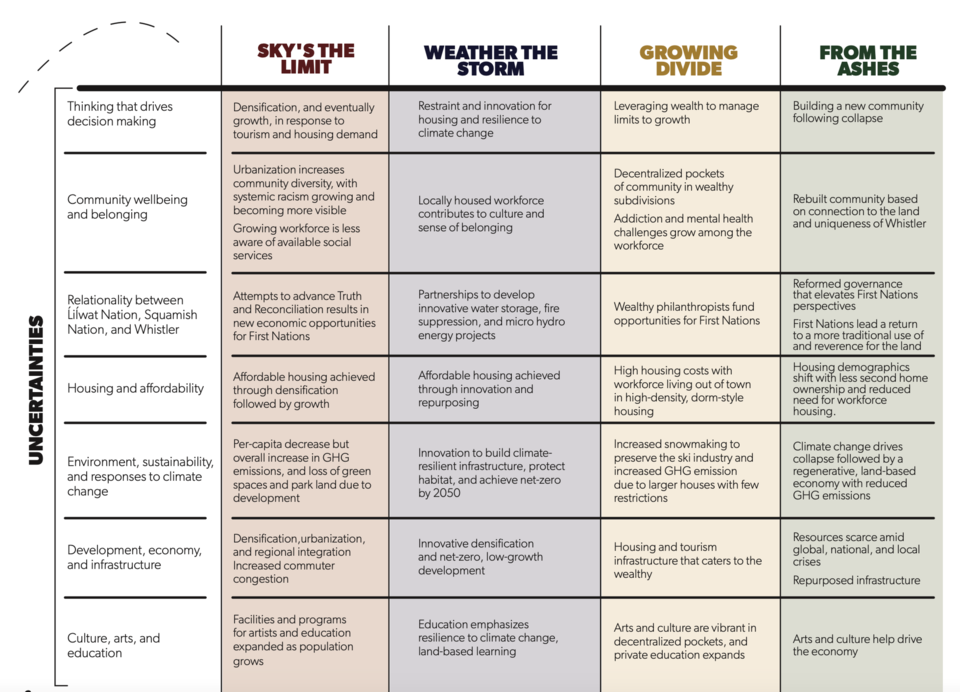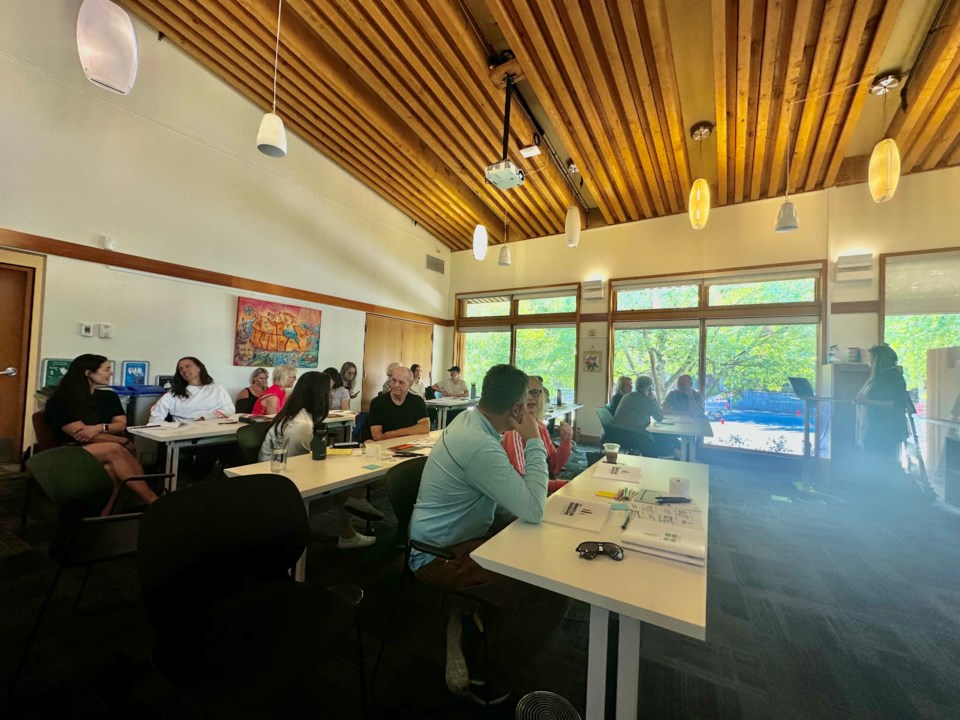As part of the Whistler Sessions team since its inception, MMGY Origin’s partner and executive creative director Danielle Kristmanson was one of about 40 locals tasked with collaboratively imagining four possible scenarios for the resort’s future.
Those sessions took place over a three-month period ending in February 2022, resulting in four highly-detailed, realistic, but not-always-rosy examples of what Whistler could turn into by 2050.
The scenarios explored what the resort could look like if it caved to increasing pressure to densify and grow, becoming a populous city in the mountains, or if it instead practised restraint and prioritized climate resilience. A third scenario imagined Whistler’s future if the resort leveraged the significant wealth available, gearing the tourism economy primarily towards the rich, while the fourth envisioned a Whistler forced to rebuild after collapse.
So, when client Tourism Whistler came to Kristmanson’s branding and creative content agency last year around the same time the scenario planning exercise wrapped up, seeking Origin’s help communicating Whistler’s future as a sustainable resort destination in its annual marketing campaign, “I thought it was a perfect idea for me to brief my team on some of this Whistler Sessions stuff,” she recalled.
While the scenarios ultimately “provided some quality material” to help build Tourism Whistler’s campaign, that initial briefing didn’t exactly go according to plan. Laying the four scenarios on her staff in a 90-minute meeting, they struggled to process the potential futures Kristmanson had taken months to absorb herself. From outrage to despair and even a few tears, “There was a lot of reaction that was, frankly, quite negative,” Kristmanson said.
The Resort Municipality of Whistler (RMOW) is hoping more local organizations and individuals follow Kristmanson’s lead in incorporating Whistler Sessions Scenarios into future planning exercises, but is offering up a few resources that aim to equip the community with a clearer understanding of exactly what the scenarios are, what they aren’t, and how the stories can be used as a tool—hopefully preventing any future tears.
The municipality officially unleashed the scenarios for public discussion on Thursday, May 25, presenting the four imagined futures in a pair of briefings held at the Whistler Public Library. A mid-day session drew nearly 20 participants to the library’s community room, followed by an evening briefing held by the fireplace in the main library. Thirty-four people attended, including three members of council, RMOW CAO Ginny Cullen and general manager Karen Elliott, according to RMOW manager of corporate projects Michele Comeau.
“It’s really important, I think, to … understand that it is this tool for discussion,” Kristmanson told attendees at the first briefing. “It’s not the end scenario itself that is important. It’s all the stuff in it that you can use to prompt conversation and think about your problems in different ways.”
Briefing attendees had the chance to dig into the Whistler Sessions Scenarios after watching a video summarizing the four stories (scroll to the bottom of this story to watch it for yourself), then quietly reflected on a series of questions like “How might the scenarios guide, or even change, the strategic direction of my community group or business?” before the room opened up for a group discussion.

“Are some of the ideas in the scenarios uncomfortable or grandiose or unwelcome? Absolutely,” Comeau told those gathered in the library's community room, “but they are plausible, which is kind of scary. And if we don’t take action as a community to form the future we want, any of those scenarios or elements of them could be possible.”
Thursday’s events had three main objectives: to inform the community about the Whistler Sessions Scenarios and the process that led to them; to spark community discussion and ideas about how to work cooperatively towards Whistler’s community vision—“and consider if we need to adjust, if a new path is revealed through this work,” Comeau explained. Finally, the event aimed to showcase how the scenarios are already being used throughout the community, like in Origin's case.
What the briefings weren’t intended to accomplish? “Solving the question of what the future of Whistler should look like,” she added. “This is really the start of a conversation to start a larger process.”
Stemming from the Whistler Recovery Working Group launched in 2020 in response to the COVID-19 pandemic, the Whistler Sessions started as an exercise probing possible futures to guide the resort beyond pandemic recovery.
The process was initiated by the RMOW and facilitated with help from Reos Partners, and based on the “Transformative Scenario Planning” methodology Reos co-founder Adam Kahane helped create in South Africa as the country transitioned away from apartheid.
The full Whistler Sessions Scenarios booklet is available to read online, alongside PowerPoint templates, planning tips, worksheets and other resources for anyone interested in hosting a Whistler Sessions Implications Workshop.




